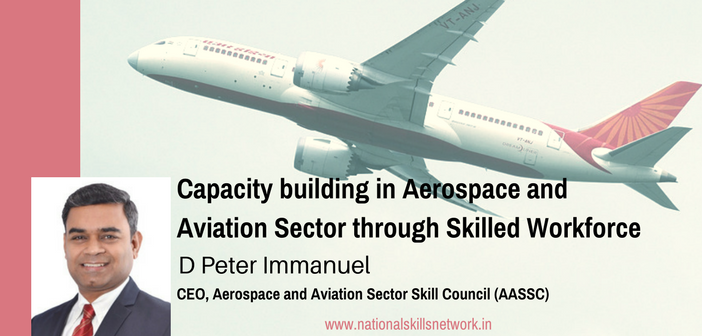Powered by a huge potential to create jobs and contribute to the economic growth of India, the Aerospace and Aviation Sector is all set to take off to higher skies. Are we ready with the required number of skilled workforce to fuel the growth of this sector? Let’s find out in this Skill Story about Aerospace and Aviation Sector Skill Council (AASSC). We caught up with D Peter Immanuel, CEO, AASSC, to learn more about the skilling initiatives and how they are working with training providers and industrial partners to ensure demand-driven model of skill development in this sector.
 AASSC is registered as a Section 8 company and it has been promoted by Hindustan Aeronautics Limited (HAL), Bangalore Chamber of Industry and Commerce (BCIC) and Society of Indian Aerospace Technologies and Industry (SIATI). The Aerospace and Aviation sector is divided into 5 sub-sectors; this includes, Aerospace Design and Development, Aerospace Manufacturing and Assembly, Airline Operations, Airport Operations, and MRO (Maintenance Repair and Overhaul). The first two sub-sectors come under the category of Aerospace and the last three will fall under the category of Aviation. This makes it a comprehensive sector covering a wide spectrum of activities such as design, development, production, operations, airport services, etc with a functional overlap and close interrelationship between the sub-sectors.
AASSC is registered as a Section 8 company and it has been promoted by Hindustan Aeronautics Limited (HAL), Bangalore Chamber of Industry and Commerce (BCIC) and Society of Indian Aerospace Technologies and Industry (SIATI). The Aerospace and Aviation sector is divided into 5 sub-sectors; this includes, Aerospace Design and Development, Aerospace Manufacturing and Assembly, Airline Operations, Airport Operations, and MRO (Maintenance Repair and Overhaul). The first two sub-sectors come under the category of Aerospace and the last three will fall under the category of Aviation. This makes it a comprehensive sector covering a wide spectrum of activities such as design, development, production, operations, airport services, etc with a functional overlap and close interrelationship between the sub-sectors.
 Growth and scope for skill development in Aerospace and Aviation
Growth and scope for skill development in Aerospace and Aviation
Indian Aviation Sector has been the fastest growing market in the world for many months. The growth potential is immense with about 100 airports coming up in India to improve regional connectivity. To match this growth, we will have more companies producing commercial aircrafts in India, thus giving a boost to Make in India initiative. And, we already have a strong base in the production of defence aircrafts.
Progress in the aviation sector can turn around the whole economy and accelerate the growth of GDP. The impact will be wider and deeper since there a huge scope for direct and indirect job creation in this sector along with jobs in Tourism, Hospitality and other allied segments. The growth could be unstoppable as India prepares herself with better infrastructure and connectivity to attract more investments for enhanced productivity.
Training programs and other initiatives from AASSC
As per the guidelines of National Skills Qualification Framework (NSQF), we have shortlisted 70 job roles based on industry demand and criticality in all 5 sub-sectors. We have carried out functional analysis and created occupational maps for these job roles. Out of the 70 job roles we have shortlisted for the Aviation sector (that includes Airport, Airlines and MRO), 38 job roles are notified by NSDC. In Aerospace Design, 9 job roles are submitted to NSDC, making it a total of 47 job roles. Besides, there are 23 job roles for the manufacturing and assembly segments under evaluation.
Our initial focus was to build the framework for skilling in this sector; now, we are ready to operationalize it. This is a crucial phase where we are just about to launch many projects:
- We will be launching a Multi-Skill Aviation Center in Chandigarh in January 2018. This is supported by the Ministry of Civil Aviation with Bird Group as our Training Partner.
- We will be working closely with GE Aviation that has came up with a requirement for around 600 aircraft Engine Welders and Aircraft Power Plant Welders for their manufacturing plant in Pune. For this purpose, we have launched a special project with P3 Group as third party training partner
- A proposal for Recognition of Prior Learning (RPL) program for around 2000 ground staff in Mumbai and Delhi airports is submitted to NSDC for approval. Bengaluru International Airport has also come forward with a request to launch similar program. We will be launching an RPL program with the Indian Air force and Indian Navy, especially for people who are about to retire and want to explore a career in civil aviation. We are in talks with Airbus for implementing this RPL program with 7 MRO job roles.
- For Aeropsace Design Skills, we want to set up an Aerospace Design Centre of Excellence in Bengaluru, in collaboration with P3 Group as our training partner. The proposal is already submitted to NSDC and it has 9 job roles in Aerospace Design.
- With Department for International Development (DFID) of UK, we will shortly embark on projects for Training to Trainers (ToT), Training of Assessors, Transnational Standards, Apprenticeship Framework, etc.
Apprenticeships and work-integrated training
There are some interesting developments on the apprenticeship front. For GE, we are planning to synchronize the training with Apprenticeship Model and National Apprenticeship Promotion Scheme (NAPS). We are exploring the modalities with P3 Group so that the candidates are employed after completion of training. HAL and National Aerospace Laboratories want to run their apprenticeship program aligning with NSQF-compliant job roles such as, Aerospace Composite Technicians etc. This involves customized and niche training for candidates from ITI and similar institutions to fit into Aerospace job roles rather than carrying out in a broad-based manner, as is being done presently.
Aerospace and Aviation is an aspirational sector, being niche and high-tech with high capex. We are very keen on being industry-driven as this is a regulated sector completely driven by quality and safety norms. We want to skill people as per current and future job requirements. In fact, when a training partner approaches us for empanelment, we ask them who their industry partner is. Thus, we want to ensure that we cater to the needs of the industry and society in all our endeavours.
Today, India faces a severe crunch of skilled workforce and a widening skill gap. We have mostly focused on learning and acquiring theoretical knowledge. Now the challenge is to train the workforce coming out of schools and colleges to use the knowledge to be productive and creative. This is where skills get prominence as we explore productive and creative application of knowledge.
Skill India initiative is aimed at bridging the skill gap and it cuts across all the government flagship programs such as – Start-up India, Make in India, Digital India, etc. Skilled workforce will increase productivity, improve the quality of products and services that come out of the industries and companies, and reduce cost to match global standards. Skill Development will transform Indian companies in to world class companies and take Indian economy to higher growth rates. Things are happening in the right way and right direction, but a lot more needs to be improved and done.
Here’a short video about the job opportunities in the Aerospace and Aviation sector.













Comments 2